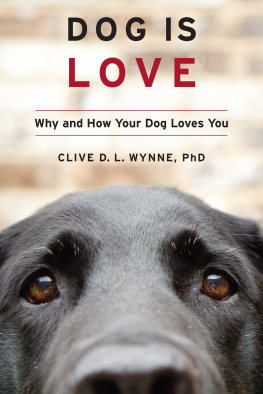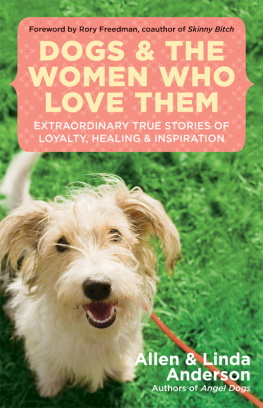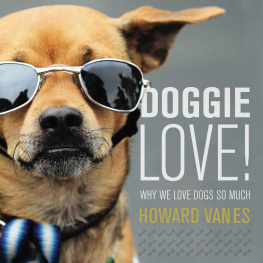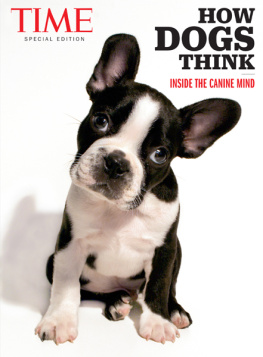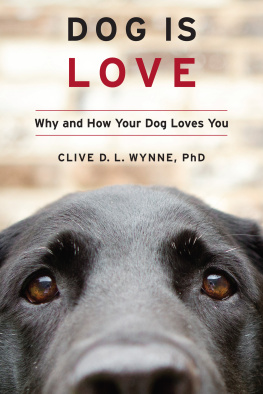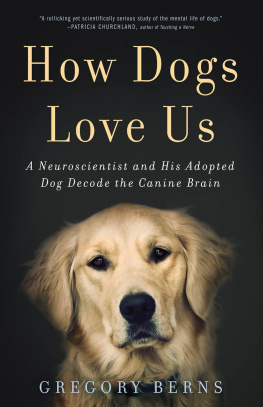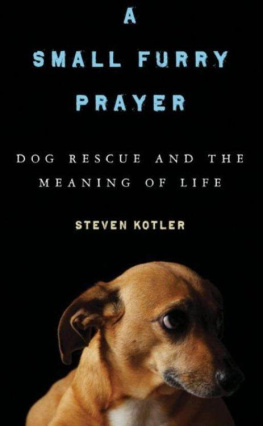Copyright 2019 by Clive D. L. Wynne
All rights reserved
For information about permission to reproduce selections from this book, write to or to Permissions, Houghton Mifflin Harcourt Publishing Company, 3 Park Avenue, 19th Floor, New York, New York 10016.
hmhbooks.com
Library of Congress Cataloging-in-Publication Data
Names: Wynne, Clive D. L., author.
Title: Dog is love : why and how your dog loves you / Clive Wynne.
Description: Boston : Houghton Mifflin Harcourt, 2019. | Includes
bibliographical references and index.
Identifiers: LCCN 2019002729 (print) | LCCN 2019003934 (ebook) |
ISBN9781328543981 (ebook) | ISBN 9781328543967 (hardcover) |
Subjects: LCSH: Dogs. | DogsPsychology. | Human-animal relationships.
Classification: LCC SF427 (ebook) | LCC SF427 .W96 2019 (print) | DDC 636.7dc23 LC record available at https://lccn.loc.gov/2019002729
Cover photograph Debbie Bryant/Thank Dog Photography
Cover design by Martha Kennedy
Author photograph Sam Wynne
eISBN 978-1-328-54398-1
v1.0819
Illustrations copyright 2019 by Leah Davies
Illustrations based on underlying photographs all courtesy of the author except for the following, granted by permission: Alexandra Protopopova.
For Sam
Who makes his dogand his fatherproud
Introduction
RECENTLY I TOOK some time away from my adopted country, the United States, to visit my native England. It was wintertime, late afternoon, and the sun had already finished its short duty for the day. Along with thousands of others returning home from their days work in the city, I was coming down the steps at a train station in the outer suburbs of London. These Victorian stations must have looked grand when they were built, and some of them still do in summer light, but at the end of a cold, dank day like this one, they are distinctly depressing: the old, dark red bricks illuminated only by dim and flickering fluorescent lights, the whole triumphant setting infused with the miserable mood of the weary commuter.
As if the scene were not dismal enough, suddenly the station rang out with the urgent barks of a dog. Down at the bottom of the steps, just behind the barriers that prevent people from getting on the trains without a ticket, a young womana child, reallywas holding on with all her might to one end of a leash. Its other end held a small but noisy and highly energetic dog, most likely a terrier of some kind. This little dog was yapping up a considerable storm.
My immediate unconscious reaction was irritation: an annoying soundtrack had been added to an already gloomy scene. But as I got closer and saw how happy this dog was, an involuntary smile crept across my face.
The dog had recognized somebody in the great human crowd. As that person got closer, the dogs barking morphed from an angry snapping into a sort of happy, almost-howling cry. Her claws skidded over the smooth floor as she struggled to get to her human. When the man was through the ticket barrier, the dog jumped up into his arms and kissed his face. I was only a little way behind and heard the man cooing to the dog to calm her down: Its OK, its OKIm back now.
Looking around, I saw the whole sea of human faces mirroring my own emotional reaction. First irritationanother tedious burden added to the tired tail end of the daythen involuntary happiness at the dogs love for his master. Smiles spread across the crowd; here and there, gentle laughter followed. People who were traveling with companions exchanged nudges and a few words. The majority of solo travelers tucked their smiles back into their pockets, but a light spring in their steps remained as a reminder of the unexpected small pleasure they had experienced at the station on their way home.
As I took in this happy scene, I was transported in memory to one of my first trips back to the UK after I had first left its shores over thirty years ago. Back then, our family dog, Benji, was still alive. My mother drove to the train station on the Isle of Wight, where I grew up, to collect me, with Benji sitting up alert on the front passenger seat. Since people in the UK drive on the left side of the street, in British cars the positions of driver and front passenger are reversed, compared to those in the United States. This meant that, to my tired and jetlagged eyes, accustomed to seeing drivers where now Benji sat, my dog appeared to be driving the car. My confusion barely had time to register when the car pulled up at the curb, and I opened the passenger door to meet Benjis paroxysm of joy at seeing me again. As soon as he saw me, Benji went crazy with pleasure, just like the terrier at the train station many years laterand just like me, although I kept my emotions under tighter control.
At first glance, Benji may not have seemed particularly special; he was just a fairly small black-and-tan shelter mutt. But he was very special to us. Dabs of sandy-brown color around his eyebrows made his eyes especially expressiveparticularly when he was puzzled. We loved teasing him, and he seemed to take all our pranking in good spirit. He could prick up his ears to show curiosity. With his tail he could express happiness and confidence, and he showed his affection with licks from his tongue (which felt like wet sandpaper and elicited protests from my brothers and me, although we felt honored by his attention).
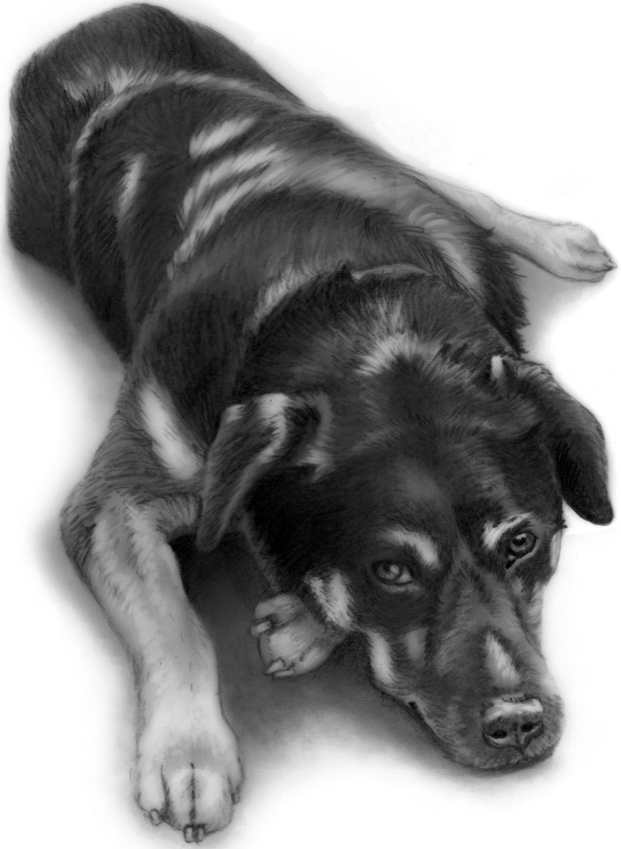
My childhood dog, Benji, sometime in the early 1980s
Benji, my brothers, and I all grew up together in the 1970s on the Isle of Wight, off the south coast of England. When my younger brother and I came home from school, we usually would plunk ourselves down on the sofa, whereupon we would hear and then see Benji racing in from the back garden. Ten feet away, he would launch himself into the air and land directly on top of us, thwacking us with his tail and kissing us each in turn, his little body practically in spasms of joy at being reunited. He clearly loved usor at least, that seemed indisputable to us at the time.
Many years passed. Benjis short life ended; I busied myself with my wandering life. But my memory of the dog of my childhood endured, as did my fascination with the minds of species other than our own.
In time, I gravitated toward academia, where I came to study how different kinds of animals acquire knowledge and how they reason about the world around them. I wanted to understand how animal minds differ from our human minds. To what degree are human abilities to reason, think, and communicate special to us, and to what extent are they shared by other species on this planet? People are often interested to know whether there are thinking beings on other planets, but it was the other minds on our planet that I wanted to learn about.
As a professor of animal psychology, my research at first focused on the most common residents of any lab in this field: rats and pigeons. And for a decade, I lived and worked in Australia, where I was able to do studies on really cool marsupial species that no one had looked into before. It was a great life, full of fascinating intellectual puzzles and interesting discoveriesyet I wasnt completely satisfied.
In time, I realized I wasnt interested in animal behavior in isolation. Rather, I was drawn to the relationship between people and animals. And, of all the thousands of animal species on this planet, none shares a stronger and more interesting bond with our own than do our dogs.
In retrospect, Im embarrassed that it took me so long to realize that I needed to be studying dogs. Their behavior is so rich: there are dogs that sniff out cancer and contraband, dogs that console trauma survivors, and dogs that help blind people cross busy city streets. And dogs and humans go way back. Indeed, there is no animal with whom people have had a longer or deeper relationship.

